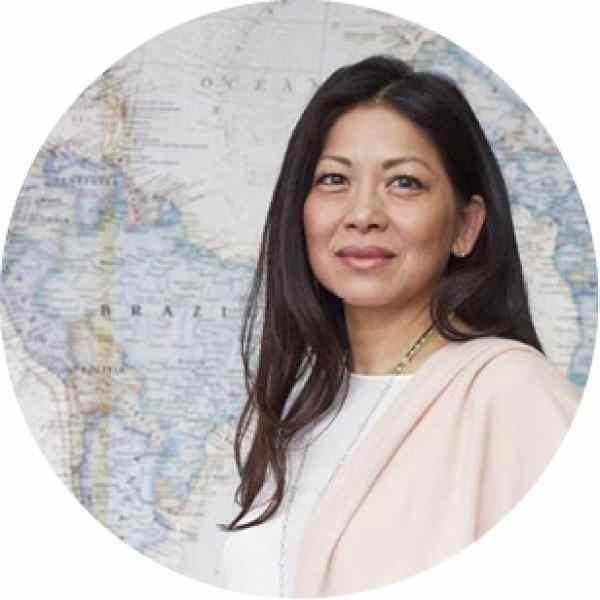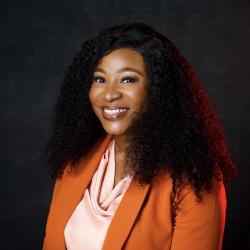Introduction
Karen Tse is building international coalitions to support public defenders in emerging democracies. Through a replicable sequence of training, structural reform, and international support, Karen enables societies to pursue the basic rights to legal representation and protection from mistreatment using the law.
The New Idea
Karen’s vision is straightforward: a global movement to improve criminal defense systems, particularly regarding due process and the rights of the accused. Karen believes citizens worldwide can and should have a role in supporting legal aid bureaus and criminal defenders, but the human rights field has not provided many constructive ways to do so. So Karen is forming “Communities of Conscience,” comprising public defenders’ offices in other countries, bar associations, law schools, law firms, businesses, and other civil institutions interested in a particular target country or human rights. They do everything from raising money to equipping legal-aid offices to providing expert assistance, volunteers, information systems, and close collaboration on procedural reform.
International support for human rights and legal reform is not new, but Karen is introducing a new methodology to the field. To begin, she works with governments, not against them. Karen’s organization, International Bridges to Justice (IBJ), is the first citizen-sector organization to have a formal agreement to work with China’s legal aid bureaus on criminal law. Karen does not use advocacy as a tactic—no damning reports, no gruesome photographs, no candlelight vigils for political prisoners. Instead, Karen concentrates on the fundamentals of systemic reform: rooms in police stations where attorneys and clients consult in confidence; information systems that track cases and clients; agreements with police on advising suspects of their rights; and how police notify lawyers when suspects request counsel.
IBJ opens relationships by working intensively within the system, but Karen understands that long-term support must be a citizen-led effort, rather than the programmatic specialty of her organization alone. IBJ’s goal is to build the bridge, ensure its strength, and direct international traffic to flow through it. Karen pioneered this style in postwar Cambodia and is now linking Bridges to Justice with American and European lawyers and citizen groups in China and Vietnam, following particular issues and programs. IBJ has access to 8,000 defenders in Cambodia, China, and Vietnam, who serve over 1.3 billion people. As IBJ progresses, people interested in criminal justice can contribute to legal reform from any country around the world.
The Problem
Societies worldwide are struggling with technical and cultural obstacles to criminal-justice reform. Just a few years ago, posters hanging in Chinese police stations still read: “Confess and the State will treat you with benevolence. Deny your guilt and face harsh punishment!” Until dedicated criminal defense systems are established, persons accused of crimes and the lawyers representing them do not have the tools and systems that guarantee fair representation and due process. Wealthy defendants and those in high-profile cases may obtain expert counsel, but most people are not rich and most court cases do not make headlines. The public defender—advocate for the average citizen, critic within the system, and thorn in the side of the state—is still a new and untested role.
This is not a theoretical problem, but a matter of life and death. In many emerging democracies, suspects are taken into custody without charges. There is no legal oversight of the tactics police use to arrest persons or gather evidence. Police and prosecutors do not advise defendants of their rights, and investigators extract information, including confessions, using coercive tactics, including torture and indefinite detention. One waits in jail without access to family, legal counsel, medical assistance, or expected dates to trial. Eventually, the prisoner is led to the courthouse, a trial takes place, and a verdict and sentence are announced. Many suspects of course, never go to trial, but stay in legal purgatory indefinitely, until amnesty, charity, bribery, or death end their detention.
If a defense attorney is involved, he may not meet his client until the trial. Perhaps he tried to find the suspect in jail, but was turned back. Perhaps his client was booked under one name but jailed under another. If defender and client are able to meet before the trial, they still face tremendous obstacles. Where may they confer and how much time are they permitted? Who else is present during attorney-client consultations? To whom do defenders report torture and abuse, malnutrition and illness, intimidation and extortion? If the defender returns to his/her car to find all four tires flat, who takes note of this coincidence? When he/she fails to report to work one day—jailed, intimidated, or murdered—who will make the case that defenders themselves need protection? In China, defenders are frequently sentenced alongside their clients. In Cambodia, police threats against defenders are common. Other obstacles to reform fall into the category of professional discouragement: few resources, few colleagues, little acceptance and support, a narrow career path, and isolation.
Criminal defense is not a popular topic for the international human rights movement. Unlike high-profile political prisoners, ordinary suspects—persons accused of theft, battery, rape, fraud, murder—are not attractive symbols for international campaigns. They may indeed be guilty. While dissidents continue to win solidarity, many others languish in the system without trial, counsel, or protection from the violence of incarceration. Yet each case—mundane and dispiriting—tests the system’s integrity: can society deliver justice as a matter of course? The tendency to reduce legal reform to high-profile political cases prevents the human rights movement from getting involved in systemic reform.
Anyone who tackles the minutiae of reform faces an uphill journey. With or without government support, criminal defense can be dangerous work. This is why many international bar associations, bilateral projects, and legal reform programs either avoid criminal defense altogether or only skim the surface.
The Strategy
Karen’s vision requires three interdependent factors: official consent at the national level; viable partnerships for practical reform at the local level; and specific supportive roles for the international citizen sector.
A good relationship with the government is the key to success. Karen’s negotiating strategy is to fit the evolution of criminal defense into a government’s overall aspirations for social development and good international standing. In other words, Karen approaches governments with constructive arguments for investing in criminal justice reform. Foreign investors see a good legal system as a sign of political stability. Other governments have an easier time cooperating with states that have transparent justice systems. China, for example, is looking for every opportunity to improve its image ahead of the 2008 Olympics and Vietnam wants its economy to continue to grow apace.
Government consent provides Karen with formal access to IBJ’s real partners on the ground, public defenders and the legal aid systems in which they work. In China, one of her partners is Legal Aid of China (LAC), a government-supported network of 2,500 legal aid centers in all 31 of China’s provinces and autonomous regions, such as Tibet. LAC’s role, written into law in 1994, is to provide free legal counsel to poor citizens, including criminal defense. LAC faces several restrictions, including national laws allowing for the arrest and prosecution of attorneys who encourage or enable their clients to lie. Such laws operate in tandem with the pressure to confess, and the result is that outspoken defense attorneys become virtual codefendants in criminal cases. Vietnam Lawyers Association is another partner, approached with the support of their Ministry of Justice.
Karen’s objective is to help these lawyers develop their professional role and relevance. IBJ has a three-step process that forges relationships with local partners, clarifies the particular challenges they face, and creates particular international links.
The first step is training. Karen carefully recruits “legal experts” to help train defenders—for example, public defenders from San Francisco and members of the Chinese Lawyers Association in Los Angeles and other diaspora groups. She looks for people who can play an ongoing, voluntary role. She invites them not only to communicate about technical matters relating to law, but to begin building the international bridge from both ends simultaneously. Karen uses training to identify and organize constituent groups that she can link for ongoing collaboration.
The follow-up to training is further collaboration on concrete products for legal aid. The first is an “advisement of rights” campaign, in which the rights of the accused, which exist on paper but are seldom proclaimed and acknowledged. IBJ runs a competition for the most creative tactics, and supports the implementation of the campaigns. In China, the result was that on December 4, 2003, legal aid centers across the country held an “advisement of rights” campaign, using radio announcements, posters, newspaper advertisements, and pamphlets. Karen sees such campaigns as important steps in encouraging defenders to work with the tools they already have. The next step is the compilation of a criminal defense and legal aid manual. The manual is a hands-on guide that helps defenders apply existing laws and procedures to protect themselves and their clients. Because it is a joint publication with the Ministry of Justice, bearing a government logo, it has official status. Writing the manual in partnership with defenders offers an opportunity for IBJ to collaborate with them in their workplace, identifying challenges and solutions. This is why, in China, IBJ is making plans to work on manuals in several provinces, rather than publish a single national guidebook from Beijing.
This close work on introductory projects places IBJ in legal aid offices in the provinces. Karen can replicate her experience in Cambodia: working through a series of practical, mundane innovations, each a small step in itself, but collectively representing important progress in due process. These include the provision of consultation rooms; the administrative steps for informing counsel of defendants in custody; the procedures for advisement of rights; the rules and protocols for defenders’ access to clients in jail; rules of discovery and sharing evidence between prosecutors and defenders; setting up information systems to track cases; procedures for filing complaints regarding the treatment of prisoners, and so forth.
Once the sequences of activities and products are worked out, IBJ’s role is to facilitate an international citizen-based volunteer program that trains people on both sides of the “bridge”—the defenders and their supporters—to collaborate. Karen does not envision IBJ as an immense institutional presence running hundreds of projects. In each instance, IBJ’s eventual role will be to set up international “Communities of Conscience,” which are international networks that provide technical assistance through IBJ, raise money for case work, and monitor the safety of defenders.
The Person
When Karen boarded a flight to Beijing in 2001, she had exactly one entry in her appointment book, 15 minutes with the national director of Legal Aid of China. Arriving at his office, she had to plead for him to honor the meeting. Two weeks later Karen flew home, having negotiated a memorandum of understanding with the Ministry of Justice: International Bridges to Justice would help the most populous nation on earth reform its criminal justice system. Karen recalls that trip as the “culmination of everything I had been working towards in my life.” Passion, persistence, and clarity of vision have driven Karen Tse since childhood.
Her parents emigrated from Hong Kong, each sailing to America in search of a better life. They met while working at a Chinese restaurant in New York. When Karen was born in 1964, the family was living in public housing outside Cleveland, Ohio, while her father was studying to become a dentist. Seeking a larger Chinese community, they moved the family to Los Angeles in the late 1960s, when Karen was four years old. While her parents enjoyed the traditional ties to Chinatown, Karen was encouraged to assimilate into California’s melting pot. As her family began to rise up the socioeconomic ladder, Karen kept blending in: speaking Spanish with her friends, Cantonese at home, and English at school.
Karen was a good student with an uncannily mature sense of herself. She sought out teachers as friends and mentors, and established charitable activities among her peers. In ninth grade, around the holidays, she became convinced that elderly people in homes and the poor in hospitals should receive flowers. So she started calling around to florists, requesting, cajoling, begging, undeterred by rejection, encouraged by each success. The next year Karen recruited her friends to help, and this activity became a fixture of the holiday season, even after Karen went to college.
At Scripps College, Karen transformed the Asian Students Association from a social club into an advocacy group, protesting Marcos in the Philippines and the murder of Vincent Chin, the auto worker killed in a racist backlash against Japanese imports. Karen applied to graduate programs in law and divinity, but deferred both when she landed a fellowship that took her to Asia to work with Vietnamese refugees. In Thailand and Hong Kong, she saw friends beaten and imprisoned for non-violent protests.
Returning home, Karen enrolled in law school at UCLA. There were some tense moments. Some students and faculty, assuming she had been admitted under a quota for minorities, told her that she and others were taking the seats of more qualified—meaning white—students. While many in her class went on to practice corporate law, Karen took a job in San Francisco’s public defenders office.
Karen’s story suggests a stereotype: a bright, successful, public-spirited daughter of immigrants. But Karen didn’t see herself floating on the American dream. As a child deeply immersed in the Chinatown community, she was haunted by family stories of relatives and others who were imprisoned and tortured in Asia. In San Francisco courts, in the prisons, in refugee camps, in homeless shelters, Karen was learning how societies fail, time and again, on the basic promise to serve and protect all citizens.
In 1994, after four years in San Francisco, Karen took a job working on legal reform in Cambodia, part of the postwar reconstruction made possible by the Paris Accords. Karen began training human rights advocates, none of whom were lawyers, on the rudiments of criminal defense. The project became Cambodia’s first legal aid agency. Working under the auspices of the United Nations, Karen set up the country’s first arraignment court. Karen’s work in the mid-1990s led to the founding of two human rights organizations that continue to challenge and improve the system, the Cambodian Defenders Project and Legal Aid of Cambodia. As a judicial mentor working with the United Nations Center for Human Rights, she trained prison guards, police, and judges. Her innovative work in Kandal Province was lauded at the time, and today the Kandal judiciary is still reaping the benefits of the structures set up during that period.
Karen returned to the U.S. in 1997 to attend divinity school. By the time she received her degree at Harvard, she had already founded International Bridges to Justice and was thinking of little else. Few believed. After all, they pointed out, her work in Cambodia had been a fluke, buoyed by the postwar reconstruction. China would be too big and dangerous. Nervous advisors stopped returning her calls. Karen, penniless but determined, managed to raise five thousand dollars and went to Beijing.
Early in the founding of IBJ, Karen recruited an Andersen consultant to help her work out a strategic plan. It wasn’t too long before that plan included marriage and a move to Switzerland. Today Karen, her husband Alex, and their son Noah live in Geneva.




